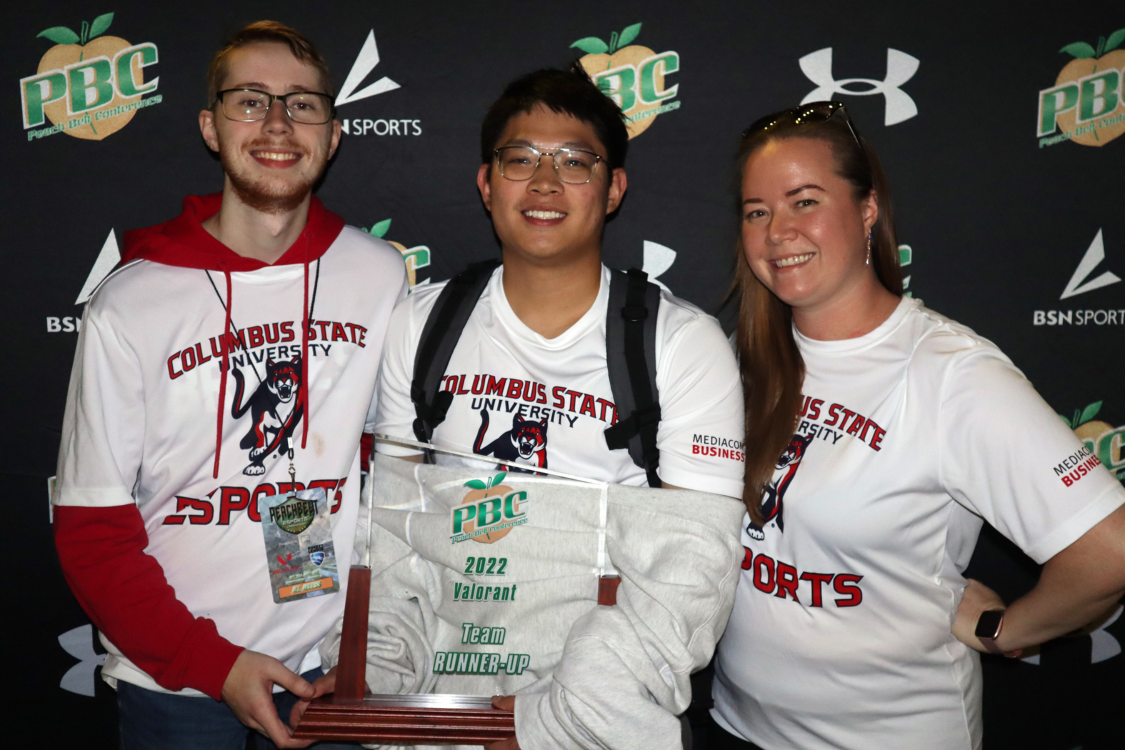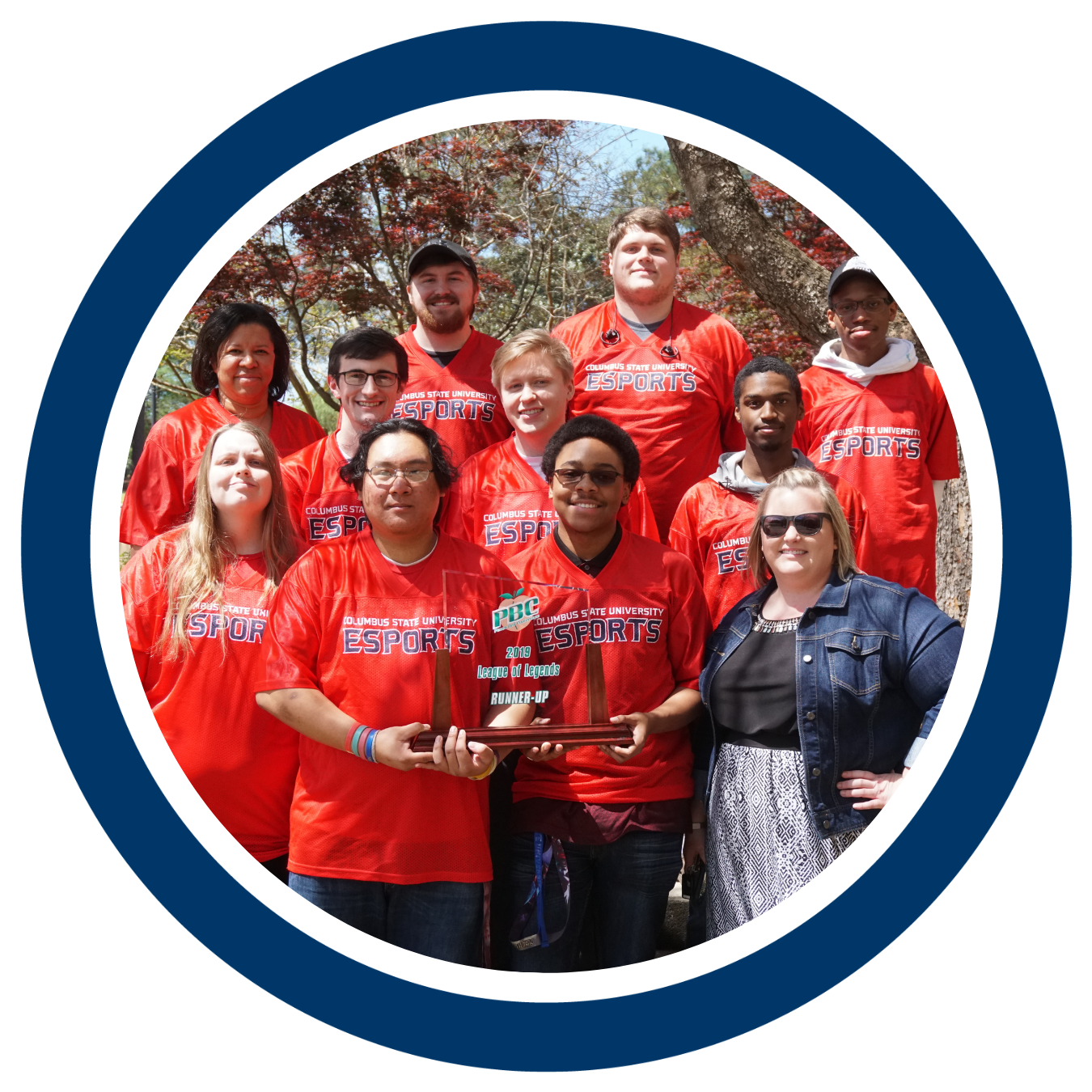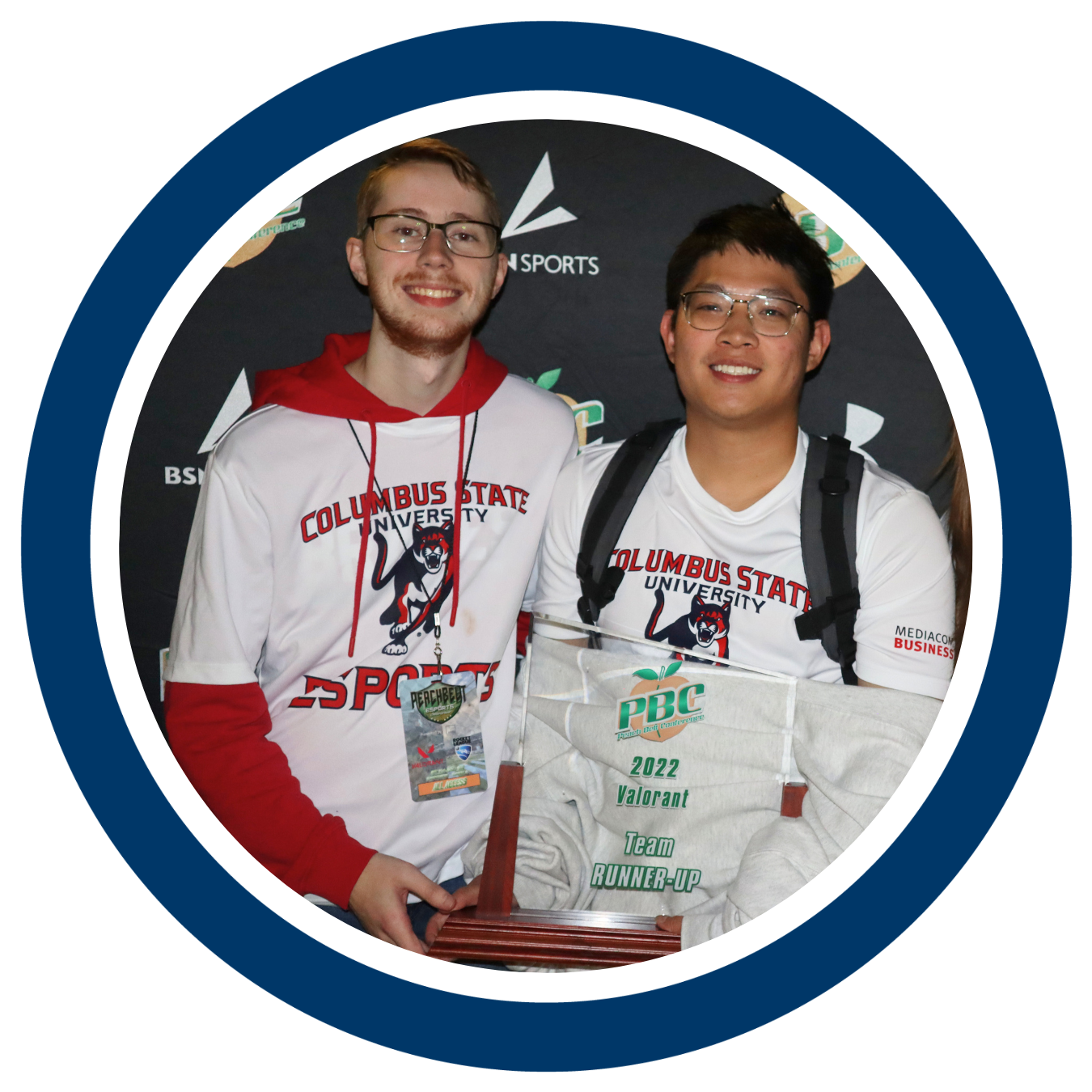A COMMUNITY WITHIN A COMMUNITY: esports teams provide players sense of family
May 23, 2023

This is the fourth of a five-part series on Columbus State’s esports program.
Competing in esports is more than about racking up points and wins. For many members of Columbus State University’s esports program, their teammates and the broader competitive environment are their “circle.”
“College can already be a tough place to make new friends. Esports has provided many of our team members a community within a community,” CSU esports coach Dr. Sharon Welburn said. “I've seen many of our quietest students come out of their shells during a season and break away from the shy, loner stereotypes often associated with gamers.”
Evan McAbee, a junior from Columbus pursuing a degree in computer science with a focus on games programming. noted that esports teams go beyond the bounds of a “normal” friendship.
“The sense of community esports provides is unlike normal friendships. You win and lose together, but you also hang out with them. This community has benefited me greatly as I have become great friends with my teammates," he said.
 Accounting alumnus Vunty Wan '19 (pictured in the front row, second from left with
his 2019 League of Legends team) from Fayetteville, Georgia, looks back on his CSU
esports days with fondness.
Accounting alumnus Vunty Wan '19 (pictured in the front row, second from left with
his 2019 League of Legends team) from Fayetteville, Georgia, looks back on his CSU
esports days with fondness.
In my experience, the community of people that I had come to be around were amazing supportive people. They were hard-working individuals and made everything fun,” the former coach and original League of Legends team member said. “Even if we had practice or a scrim, it was always light-hearted—they gave their best. It was one of my most enjoyable times in college.”
As one of the few female members of the team, Aislin Ekey likens the sense of community to an extended family—including a group of big brothers looking out for her.
“I often feel like I have a gang of big brothers looking out for me,” the esports student assistant and freshman communication major from Perry, Georgia, said. “Even though we butt heads, I know the bond we have as friends is real. Without esports, I would not love college as much as I do now. It has really changed my life in so many positive ways.”
“Think back to a high school sports team you were on or even a little league team. When you won, you won together. When you lost, you lost together,” said Daniel Collins '19, an original League of Legends team member who eventually moved to coaching. “You bonded over a common struggle—and it made you stronger together. There are shared experiences that you have with people on your team that no one else can understand unless you were part of the experience.”
 That bond has led to many friendships among CSU student-gamers that extend well past
graduation.
That bond has led to many friendships among CSU student-gamers that extend well past
graduation.
“I know many CSU players have talked about how they had no friends or anyone to spend free time with before joining the team. Esports allowed them to develop relationships outside of video games and establish a long-lasting community as a result,” said Andrew Brooks (pictured on the left with teammate Jonathan Kreyling-Hoag on the right), who graduated with a psychology degree in December 2022. “I personally still have connections and friendships with almost all my former teammates—some I continue to call my best friends.”
“Esports is community,” noted Columbus Got Game founder and veteran gamemaster Christopher “Preach” Poirier. “Just like traditional athletes find their community around their sport of choice, esports provides a place for gamers to grow and learn together.”
Expanding the esports community
Columbus Got Game has become a physical rallying point for the CSU esports community—where the nonprofit, as Poirier puts it, “mentors players and leaders, and generally being CSU's cheerleader in all they do.” With the team's current Davidson Student Center gaming room being large enough to host only one gaming team at a time, Columbus Got Game provides a place where the entire CSU esports program can claim and enjoy that sense of community.
 “This community is what our nonprofit, Columbus Got Game, is all about,” Poirier continued.
“We specifically chose to make a safe space for esports, tabletop gamers and role
players to have their own community. People gravitate toward people like themselves,
and we all seek to belong somewhere. Esports provides a place where traditional sports
might not have filled that gap in the past.”
“This community is what our nonprofit, Columbus Got Game, is all about,” Poirier continued.
“We specifically chose to make a safe space for esports, tabletop gamers and role
players to have their own community. People gravitate toward people like themselves,
and we all seek to belong somewhere. Esports provides a place where traditional sports
might not have filled that gap in the past.”
Esports' growing presence at the high school level is creating pipelines for those players looking to compete at the college level. With several nearby Northside High School alumni now continuing their esports “career” at CSU, the university's esports team has developed a mentoring and player-development partnership with the high school.
As partnerships with Columbus Got Game and other high school-based esports teams, Welburn noted these relationships are helping Columbus State reach its next generation of students.
“Middle school and high school students look up to our collegiate gamers,” she explained. “They see our players as ‘oh, that’s what I want to do’ or ‘that’s who I want to be’ when our players host exhibition matches or provide one-on-one coaching. Our esports program and players have been highly influential within our community.”
The CSU esports community includes another important partner, which literally laid the foundation for the program. In 2020, cable television giant Mediacom Business teamed up with Columbus State to expand its esports infrastructure. This included building and equipping the current gaming room in the Davidson Student Center and providing it with a dedicated 1 Gig fiber optic connection.
“For schools like Columbus State University to [compete] and improve performance, high-capacity broadband is critical,” Dan Templin, senior vice president of Mediacom Business said at the time the company announced its plans to invest in CSU esports. “We're fortunate to be able to trailblaze this esports movement alongside CSU and provide the fiber-optic connectivity we know is going to help fuel these types of initiatives.”
Mediacom's $1 million in corporate support also included ongoing scholarships to attract and retain team members to the university's esports team. Currently, CSU provides $500 scholarships each eight- to 10-week competitive season for team members who make the team. They must have a minimum 2.0 GPA at the time and they can't have any academic strikes against them.
For more information about CSU's esports programs and points of contact, visit the team's website or follow the team on YouTube, Twitch, Facebook, Instagram or Twitter.
Read other articles in this series:
- Part 1: MORE THAN A GAME: esports cultivates competition, confidence for student-gamers
- Part 2: ESPORTS IS 'WEIRD': how it mirrors, differs from traditional college sports
- Part 3: AN EXPANDING SPORT: esports' growth gives competitors room to develop professional, life skills
- Part 4: A COMMUNITY WITHIN A COMMUNITY: esports teams provide players sense of family
- Part 5: A BRIGHT FUTURE: opportunities abound for esports' growth at CSU, nationally
Media contact:
Michael Tullier, APR, Executive Director of Strategic Communication + Marketing, 706.507.8729,
mtullier@columbusstate.edu